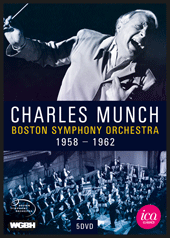Charles Munch, conductor
ICA Classics ICAB 5130 (5 DVDs)
The Boston Symphony Orchestra was a television pioneer. More
than 150 live concerts were broadcast by the Boston TV station WGBH between
1955 and 1979. ICA has taken on the task of making many of these performances
available on DVD. This box collects a series of performances with Charles Munch
at the podium, all recorded at Harvard University’s Sanders Theater. The sound
quality is variable and not all of the performances are equally satisfying, but
the best performances here are truly memorable and the collection as a whole is
an important historical document.
Charles Munch, who was himself French, is probably best
known today for his recordings of the French orchestral tradition, with a
particular affinity for Debussy, Ravel, Berlioz, and Saint-Saens. But on this
disc we have something completely different, with a range of composers who do
not typically come to mind when one thinks of Munch. The collection features a Haydn symphony
(No. 98), two Mozart symphonies (No. 36, the Linz, and No. 38, the Prague), two
Beethoven symphonies (Nos. 4 and 5), Schubert’s No. 5, and Schumann’s No. 2, in addition (stunningly) to Bruckner 7 and
Mendelssohn 4 and 5 (the Scottish and the Italian).
Brisk conducting is a common thread through all of these
performances. Bruckner’s Seventh is dispatched in a little over 50
minutes, for example. For comparison, relatively few performances come in at over
60 minutes. At its best this can be exhilarating. Munch’s tempi are very
successful in Schumann’s Second, where Munch and the BSO deliver a
blistering performance of the first movement and a rousing finale. The Allegro
vivace first movement in Beethoven’s Fourth is vivace indeed and the
searching and well-paced finale in that symphony is an excellent bridge to the
scherzo and finale, which are taken at a racing pace. The two Mendelssohn
symphonies lend themselves to Munch’s pace.
But at times Munch’s addiction to speed is his undoing. The
Bruckner 7 performance is really rather disappointing (although the orchestra
and audience seemed pleased enough). It would have been interesting to hear how
a conductor as rhythmically precise and sensitive to details of orchestral
color as Munch is could perhaps shed new light on the symphony. But there’s little
time in the sprint to stop and smell the roses.
To my ear the finest performances here include Haydn No. 98 ,
which Munch takes in a more Romantic vein than we would now be used to – an
approach that pays dividends in the luscious string sound in the Adagio. Munch
is ideally suited to the playful finale. The two Beethoven symphonies are also
very successful, particularly the Fifth where Munch’s driving
momentum is strengthened not undermined by flexible tempi. The performance of
Schumann’s Second is very memorable.
Anyone interested in the history of conducting should think
seriously about this set. It documents a powerful and exciting performer in a
relatively unfamiliar repertoire (as far as Munch recordings are concerned). There are highs and lows, but from a purely
musical point of view some of the performances are stand-outs. I would
certainly encourage buying the set, but all of the DVDs are available
separately and if funds are limited then I would recommend DVD 1 (the two Beethoven symphonies ),
followed by DVD 4 (Schubert 5 and Schumann 2).

No comments:
Post a Comment